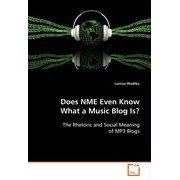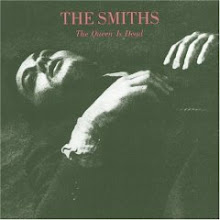
To me, making a tape is like writing a letter — there's a lot of erasing and rethinking and starting again. A good compilation tape, like breaking up, is hard to do. You've got to kick off with a corker, to hold the attention (I started with "Got to Get You Off My Mind", but then realized that she might not get any further than track one, side one if I delivered what she wanted straightaway, so I buried it in the middle of side two), and then you've got to up it a notch, or cool it a notch, and you can't have white music and black music together, unless the white music sounds like black music, and you can't have two tracks by the same artist side by side, unless you've done the whole thing in pairs and...oh, there are loads of rules.
Ah, the mixtape. It's the bonkers sort of logic in the above passage that made me really identify with Nick Hornby's High Fidelity with such fervor when I read it for the first time six or seven years ago. As crazy as this detailed, agonized analysis is to regular people and casual music fans, it makes such completely perfect sense to me and has done for at least the past 11 years of my life. Even when my taste was pretty pitiful and the majority of my music was being recorded off the radio, I had a feel for the aesthetic of the mixtape and its "rules." It's precisely why the shuffle function on both my iTunes and iPod can often grate on me (unless by some beautiful serendipity it seems to read my mind or place songs I would never have put together side by side and they work). And it's why I actually got angry at work one morning.
There was a year where I was doing inventory counting every weekday morning from 7 to 10 at the bookstore I was working at. Though the hours were hellish for a night owl like me, the job was actually easy enough and the best part for me was the fact we were allowed to play whatever music we wanted to in the morning (as opposed to bookstore-appropriate fare that had to be played when the store was actually open). I started bringing my own CDs on a regular basis and many of them were carefully crafted mixes (though my three co-counters and I had an informal agreement about equal rights to play whatever we wanted, I fully admit that I monopolized it). Then some time toward the end of my stint as a morning shift person, there was a morning when other co-workers had to come in for some early morning tasks and the music took a revolting turn. It wasn't even that I didn't like what was being played (which I admittedly didn't) because I understand that everyone has their own musical tastes. I was getting increasingly irritated and then irate because the music made no sense in the order it was being played - Michael Jackson played adjacent to some band like Nickelback, which was then followed by Christina Aguilera, and then some mainstream country song. I guess it ran like a Top 40 radio playlist, utterly random. And I felt like I was going mad with a multiple personality disorder.
I started ranting to a co-worker, who had relatively pretentious music tastes, about the abhorrent assortment and order of the music being played. He agreed with me, but neither of us could figure out who would put songs together so haphazardly on the same CD. When he finally went to investigate, he discovered that someone had put several mix CDs on shuffle. Not only were the mixes, as separate entities, incoherent, but they were being remixed by a cold-hearted machine. The last straw came when two of the original co-counters quit and others joined the shift. They felt perfectly all right with putting their CDs in with my mix. On shuffle. Okay, so it's not exactly the reason I quit. But it could have been.
Ah, the mixtape. It's the bonkers sort of logic in the above passage that made me really identify with Nick Hornby's High Fidelity with such fervor when I read it for the first time six or seven years ago. As crazy as this detailed, agonized analysis is to regular people and casual music fans, it makes such completely perfect sense to me and has done for at least the past 11 years of my life. Even when my taste was pretty pitiful and the majority of my music was being recorded off the radio, I had a feel for the aesthetic of the mixtape and its "rules." It's precisely why the shuffle function on both my iTunes and iPod can often grate on me (unless by some beautiful serendipity it seems to read my mind or place songs I would never have put together side by side and they work). And it's why I actually got angry at work one morning.
There was a year where I was doing inventory counting every weekday morning from 7 to 10 at the bookstore I was working at. Though the hours were hellish for a night owl like me, the job was actually easy enough and the best part for me was the fact we were allowed to play whatever music we wanted to in the morning (as opposed to bookstore-appropriate fare that had to be played when the store was actually open). I started bringing my own CDs on a regular basis and many of them were carefully crafted mixes (though my three co-counters and I had an informal agreement about equal rights to play whatever we wanted, I fully admit that I monopolized it). Then some time toward the end of my stint as a morning shift person, there was a morning when other co-workers had to come in for some early morning tasks and the music took a revolting turn. It wasn't even that I didn't like what was being played (which I admittedly didn't) because I understand that everyone has their own musical tastes. I was getting increasingly irritated and then irate because the music made no sense in the order it was being played - Michael Jackson played adjacent to some band like Nickelback, which was then followed by Christina Aguilera, and then some mainstream country song. I guess it ran like a Top 40 radio playlist, utterly random. And I felt like I was going mad with a multiple personality disorder.
I started ranting to a co-worker, who had relatively pretentious music tastes, about the abhorrent assortment and order of the music being played. He agreed with me, but neither of us could figure out who would put songs together so haphazardly on the same CD. When he finally went to investigate, he discovered that someone had put several mix CDs on shuffle. Not only were the mixes, as separate entities, incoherent, but they were being remixed by a cold-hearted machine. The last straw came when two of the original co-counters quit and others joined the shift. They felt perfectly all right with putting their CDs in with my mix. On shuffle. Okay, so it's not exactly the reason I quit. But it could have been.
I felt offended on the music's behalf - how could someone treat songs as though they had no meaning in relation to anything else? As though they didn't deserve to be presented artfully? To me, it's the equivalence of a painting with clashing colours or a lack of spatial harmony. Even postmodern paintings, which appear to break all rules, have something behind them trying to be communicated, so if there are clashes or misuses, they are deliberate and still mean something. On some level they should still be aesthetically pleasing. Otherwise you may as well be listening to the hamfisted radio.
There is also something specifically mythological about the mixtape, though. It requires a forethought that CD mixes and computer playlists don't. It requires a thorough knowledge of one's music collection - a knowledge of how a song sounds, what mood it conveys, without actually having to listen to it first. If you make an error, you have to rewind and retape. Sometimes you do this several times before you get it right. If you're taping from vinyl, it requires an even more delicate touch and timing. You have to account for time limitations per side (in my early days of mixtape-making I had several incidents where the tape ran out in the middle of a song). You have to decide whether the second side will differ or change theme or mood. And how you'll manage to transition between tempos and styles.
When I was in high school, I was so obsessed with links between songs that I made a series of about 12 tapes that had a constant link (whether verbally or thematically) from song to song and tape to tape that I took with me on a band trip to Europe. For a group project in English class, I volunteered to make the intro tape to our presentation - the only real criticism our teacher had about the entire project was the fact the tape was too long. I couldn't stop finding lines in songs about the theme of corruption and taping them seamlessly together. To compile it, it took me hours in front of the double cassette deck in our den, but I didn't notice. And this artform extended beyond the music and to the tape cover art. I imitated my dad's habit of cutting images and words out of magazines and making mini-collages to insert in my mixtapes' cases (you can view some of those teenage attempts in the above photo - and, yes, that is a Mind the Gap sign slapped across Britney Spears's head). It was a challenge trying to make something that visually conveyed what the mix was aurally and that also fit within the strict confines of a tape case. But this added DIY element just made the mixtape matter all the more to me.
I miss mixtapes. And I know I'm not the only one because countless other bloggers make "mixtape" posts on a regular basis or treat their entire blog like a mixtape shared with friends, and applications like muxtape and devices like mixas continue to confirm this need for the mixtape ethos. (The unfortunate and unnecessary demise of muxtape is fodder for a different post at a different time.) This sharing aspect is just as signficant as the artform itself. Mixtapes are meant to make connections between music lovers - music is both a way of conveying ideas and emotions and a way of opening up others' musical horizons and exposing them not only to new music, but new thoughts and new feelings. The DIY aesthetic for mixtapes speaks to something beyond the ugly commercialized aspect of music as an industry. It speaks to an indie myth - a myth of making art for the sake of art and for the people who enjoy it, who then create more art because of it.
I don't think I've made an actual mixtape for the past two years (and the only reason I was still making them up til that point was because our car still only has a tape player in it), and I'm sad about this. But now of course I make weekly mixes for download on this blog, and I look forward to it every week with more anticipation than most people would consider healthy - even when I feel a bit stumped as to what my theme will be. I put just as much care into crafting these mixes as I did as a teenager making mixtapes, and whether people actually download all of the songs in each mix, or whether they even notice the fact they're in a particular order, I can never truly know. All I know is that I deliberately put them in that order and that they are meant to be listened to in that order. The method to the madness is in the selection and arrangement, and it's these aspects of the method that keep me tied up in front of the computer for entire afternoons and evenings.
I suppose the art of the mixtape is linked to the ethos of the ultimate fan. Fans not only compulsively collect, but they also arrange. The way a collection, whether it's diecast car models, stamps or sports cards, is organized and displayed is just as important as the collection itself because it's a way of presenting disparate things in relation to each other and making a bigger meaning than any item could have on its own. And isn't that what's at the heart of the mixtape?
**I'm in the process of working on a year-end round-up of all of my weekly mixes, so come December there will be quite the special (and lengthy) edition of Everyday is Like Sunday, Except for Blue Monday and Ruby Tuesday, and...Well, Friday I'm in Love.**
It Started With a Mixx - Los Campesinos
DIY - Robots in Disguise





















































4 comments:
This post made me ridiculously happy. So well said. Applause! Many things you said resonated with me, spending hours in front of the tape deck, training my fingers to be nimble enough to cut off the song at just the right nanosecond. As you said in the last paragraph, I think there is an art to fandom itself. You know what just hit me as I was reading this... the fact that songs take on new and different meanings in juxtaposition to each other makes me think of Burroughs and his philosophy of the cut-up... thoughts? You had better know that we appreciate all those hours you spend in front of the computer composing these lovely mixes and essays! Thank you so much!
I agree with the above, loved this post for selfish nostalic reasons alone. Hours like minutes in front of the radio, making my own album art, and deliberating forever over the all important track 4.
Check my blog, which aims to be a mixtape of sorts, not sure if it succeeds, mismatch perhaps.
What an amazing post to stumble across. I thought it might have been coincidence that hype machine was playing 2 mix tape themed songs back to back so i had to check it out and really enoyed reading this.
Made me miss the mix tape days when i planned every journey carefully so as to have the right mood for the car and the right dynamics.
More recently my grilfriend and I got through our attempt at long-distance by compiling elaborate playlists designed to pass the time apart.
Thanks again for this, it was a great read, the tracks were ace. Im a fan.
I miss 'em too. Making CDs or playlists just isn't the same as sitting on the floor in front of your record player / CD player with all your records piled up around you, choosing the songs in real time, and digging out choices you wouldn't ever pick just by scooting through your overstuffed media player.
A good mixtape used to take forever to put together, but it was a thing of beauty.
Post a Comment